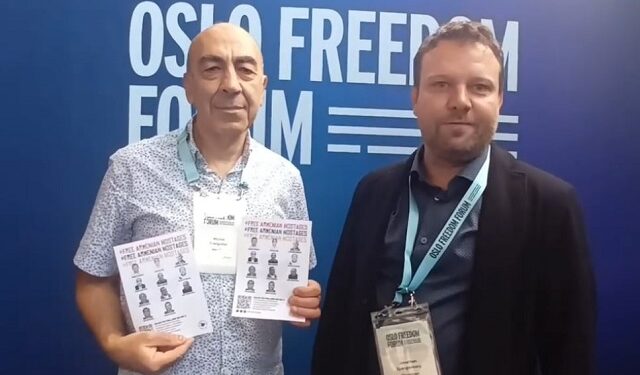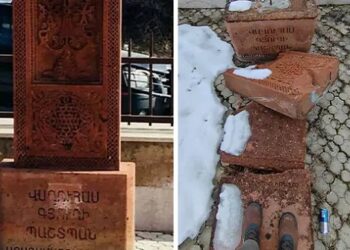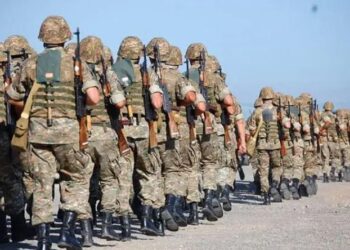
In 2024, Azerbaijan – a country ruled by the genocidal dictator Ilham Aliyev and notorious for its long-standing record of grave human rights violations – played host to COP29, the UN Climate Conference. The decision to grant such a platform to a regime responsible for the genocide of Armenians in Artsakh (Nagorno-Karabakh), carried out through a nine-month hunger blockade followed by military aggression and mass displacement, was not only controversial but deeply alarming. It was in the wake of this international event that I became fully immersed in a global civic campaign focused on a profoundly human appeal: the release of the at least 23 Armenian hostages held in Baku.
Within the global Armenian community and beyond, there are varying views on the effectiveness of activism and advocacy related to the hostages. Some even question whether advocacy and international pressure can truly bring change, especially when the Armenian government itself remains noticeably passive on this issue. While I understand this skepticism, I firmly believe that silence ensures impunity. Change rarely happens overnight, but history shows that sustained pressure, moral clarity, and international solidarity do make a difference. Activism and advocacy may not yield immediate results, but it is often the only force that keeps injustice from being forgotten.
As a German citizen and Chairman of the Central Council of Armenians in Germany, I took my concerns directly to national political leaders. I reached out to the Chancellor, the President, the Federal Foreign Office, and numerous members of the Bundestag. The responses I received were varied, some supportive, others more cautious but what became unmistakably clear was that in order to truly build international pressure, we must go beyond institutional channels and national boundaries. We need to mobilize people of conscience across the world who see this not as an isolated ethnic conflict, but as a profound human rights crisis. That realization led me to the Oslo Freedom Forum.
The Oslo Freedom Forum (OFF) is an annual international gathering organized by the Human Rights Foundation. It brings together some of the world’s most courageous human rights defenders, journalists, artists, and political dissidents to share their stories and strategies in the fight against authoritarianism. OFF focuses particularly on societies where freedom is under attack, offering a unique platform for those who have suffered repression to inspire collective action and global solidarity.
An activist from our #FreeArmenianHostages civic movement gave me the tip about the Oslo Freedom Forum, which led me to discover this important platform. Intrigued, I applied to participate, driven by the hope that I could use this influential stage to amplify the story of the Armenian hostages on a global level. When I submitted my application months earlier, I was uncertain whether I would be accepted or how best to raise the issue once there. Upon receiving confirmation of my participation, with the clear intention to spotlight the hostages, I connected with another activist from France representing the Libertas collective. Together, we strategized around three core objectives: to inform the broader audience, to ensure the plight of the Armenian hostages gained visibility beyond our immediate community, and to build bridges for future cooperation with allies worldwide.
Together with friends from Norway, we planned a small protest at the site of the Forum, and prepared flyers with QR codes linking to our movement. In my suitcase, I had packed a megaphone, the flyers, and a banner showing our hostages. One day before the OFF started, I met Michal from Libertas and Sven, our Norwegian friend who had registered the protest. Though it was our first time meeting in person, we quickly finalized our plans and already spoke about preparations for next year.
On the morning of May 26, I arrived early to register at the Forum. For a moment, my thoughts turned to the Battle of Sardarabad, which took place on the same date in 1918 and led to Armenia’s first independence. That historical memory gave me strength. From the very beginning, I was struck by how exceptionally well-organized the Oslo Freedom Forum was. Around 1,400 participants from across the globe had gathered for this powerful event. Even before the official opening and the first keynote speakers, I had already begun speaking with attendees about the Armenian hostages in Baku.
The speeches and testimonies of the first day were not only moving, they were profoundly inspiring. I was especially touched by the story of Kim Yumi, a North Korean defector who, along with her family, risked everything in pursuit of freedom. Equally impactful were the voices of Maria Sarungi Tsehai, a prominent Tanzanian human rights activist, and Canadian journalist and author Judi Rever, who courageously spoke about Paul Kagame and the hidden truths surrounding the 1994 Rwandan Genocide. Their stories, and those of many others, reminded me that the struggle against tyranny is universal, transcending borders and individual conflicts. In essence, it is the story of Haig and Bel: the legendary Armenian forefather who rose against the tyrant and fought for freedom.
Throughout the three days of the forum, alongside the various workshops, debates, and keynote talks, we had meaningful conversations with many people who were genuinely open and eager to learn more about the Armenian hostages in Baku and the rights of the Artsakh Armenians. Many not only showed interest but also asked how they could support the cause. I was particularly struck by how well-informed some participants were, not only about the Armenian Genocide of 1915 but also about the ongoing genocide in Artsakh. One powerful example was Tekle, a Tigrayan scholar, who not only used the term Artsakh with familiarity but also offered a thoughtful analysis of the recurring patterns in genocidal strategies perpetrated by different regimes. These interactions highlighted the value of the forum as a space for dialogue and connection. My first key takeaway was the importance of simply being present on global stages like the Oslo Freedom Forum, even when our own cause is not yet at the center of attention.
We had scheduled our protest for 17:00 on the second day of the Forum, timing it for when all participants would be leaving the venue. Earlier that day, one of the Forum organizers approached us to express awareness of our planned protest and signaled his solidarity with our cause. As the time approached, it was raining cats and dogs – but remarkably, the downpour stopped just as our protest began. We were a group of about 15 people, including members of the Armenian community in Norway and supportive Norwegian friends. Through our activist network, we amplified the message across social media, reaching many others.
This year’s Oslo Freedom Forum was titled “Imagine,” and it inspired me to do just that. I imagined a powerful keynote speaker next year featuring the testimony of an Artsakh Armenian. I also envisioned a broader Armenian presence, not just two participants from two countries, but twenty voices from twenty different countries. The Forum has the potential to become a crucial platform to support the global effort to hold Ilham Aliyev, the genocidal dictator of Azerbaijan, accountable before the International Criminal Court in The Hague. And while we were there this year to bring attention to the plight of Armenian hostages in Baku, one of the most meaningful takeaways for me was the opportunity to express our solidarity with other courageous individuals who are also fighting for freedom on different places of the world.
As an Armenian by choice, I experienced the Oslo Freedom Forum as a place where the very spirit of freedom that Haig Nahabed once embodied and that became the genesis of the Armenian people is alive and shared by all who gather there. And in a world that today seems to be shifting toward tyranny and authoritarianism, this spirit stands firm, offering hope and solidarity. I remain convinced that freedom will prevail and that our struggle to bring our hostages home is not only just but destined to succeed. #FreeArmenianHostages
Chairman of the Central Council of German-Armenians Jonathan Spangenberg









